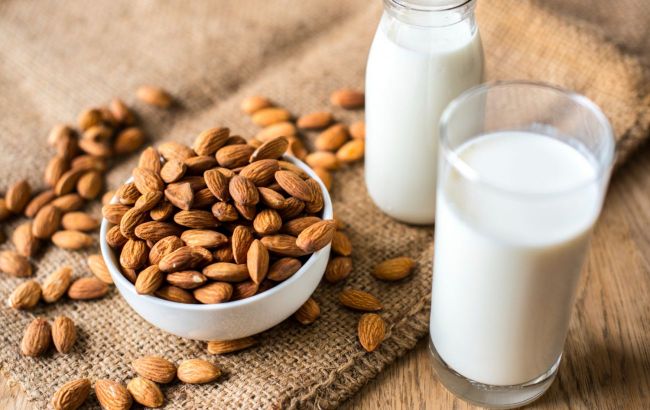Truth about whether almond milk benefits health
 Benefits of almond milk (photo: Freepik)
Benefits of almond milk (photo: Freepik)
Almond milk is loved worldwide. It is one of the most popular products because it has a very important quality – it is lactose-free, according to Eat This, Not That! website.
What’s in almond milk
The ingredients of almond milk can vary significantly depending on the brand and variety you purchase.
In its pure form, almond milk will contain only water and almonds. The advantage here is the absence of fillers, preservatives, or other questionable ingredients.
The downside is the lack of enrichment with important vitamins and minerals, such as vitamins D, E, A, and calcium, often found in other dairy products.
In its most natural form, almond milk is made by soaking almonds in water, blending them, and then straining the liquid through cheesecloth.
This process creates a liquid with a creamy consistency similar to milk. However, this processing removes the protein and fiber content from the almonds, leaving a creamy taste for the consumer.
Health benefits
Almond milk, enriched with additional vitamins and minerals, is an excellent way to increase your vitamin D, calcium, and potassium intake.
Enriched almond milk is also high in vitamin E, which helps reduce oxidation in the body and may protect against certain diseases.
Almonds are rich in sodium, which helps prevent cardiovascular diseases. Almond milk contains no cholesterol or saturated fats (which also raise cholesterol levels in the body). When cholesterol accumulates in the blood vessels, it increases the risk of developing atherosclerosis, strokes, and heart attacks.
Almond milk contains a significant amount of retinol, which protects the eyes from strain and prevents vision deterioration.
Drawbacks of almond milk
If you're not careful in choosing almond milk, you risk consuming almost 4 teaspoons of added sugar (or about 17 grams out of the recommended 25 grams) per cup.
Additionally, almond milk may not be the best substitute for children with dairy allergies.
Almond milk is not a good source of protein, even when fortified. In this case, it is better to choose fortified unsweetened soy milk.
Contraindications to consuming almonds include individual intolerance, a tendency to allergic reactions, and certain gastrointestinal diseases.
Moreover, during pregnancy, it is best to consult a doctor before introducing almond milk into your diet.
We also wrote about how much water you actually need to drink and how to ensure you're consuming enough.
This material is for informational purposes only and should not be used for medical diagnosis or self-treatment. Our goal is to provide readers with accurate information about symptoms, causes, and methods of detecting diseases. RBС-Ukraine is not responsible for any diagnoses that readers may make based on materials from the resource. We do not recommend self-treatment and advise consulting a doctor in case of any health concerns.

